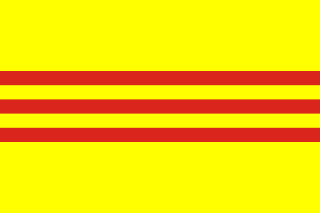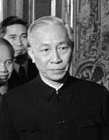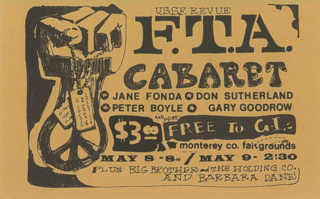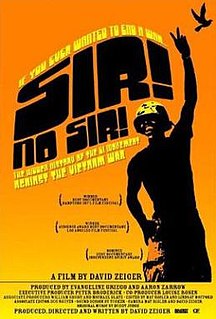Related Research Articles

The Vietnam War, also known as the Second Indochina War, was a conflict in Vietnam, Laos, and Cambodia from 1 November 1955 to the fall of Saigon on 30 April 1975. It was the second of the Indochina Wars and was officially fought between North Vietnam and South Vietnam. North Vietnam was supported by the Soviet Union, China, and other communist allies; South Vietnam was supported by the United States, South Korea, the Philippines, Australia, Thailand, and other anti-communist allies. The war, considered a Cold War-era proxy war by some, lasted 19 years, with direct U.S. involvement ending in 1973, and included the Laotian Civil War and the Cambodian Civil War, which ended with all three countries becoming communist in 1975.

South Vietnam, officially the Republic of Vietnam, was a country that existed from 1955 to 1975, the period when the southern portion of Vietnam was a member of the Western Bloc during part of the Cold War. It first received international recognition in 1949 as the State of Vietnam within the French Union, with its capital at Saigon, before becoming a republic in 1955. South Vietnam was bordered by North Vietnam to the north, Laos to the northwest, Cambodia to the southwest, and Thailand across the Gulf of Thailand to the southwest. Its sovereignty was recognized by the United States and 87 other nations, though it failed to gain admission into the United Nations as a result of a Soviet veto in 1957.

Jane Seymour Fonda is an American actress, political activist, environmentalist, and former fashion model. She is the recipient of various accolades including two Academy Awards, two British Academy Film Awards, seven Golden Globe Awards, a Primetime Emmy Award, the AFI Life Achievement Award, the Golden Lion Honorary Award, the Honorary Palme d'Or, and the Cecil B. DeMille Award.

Lê Đức Thọ, born Phan Đình Khải in Nam Dinh Province, was a Vietnamese revolutionary, general, diplomat, and politician. He was the first Asian to be awarded the Nobel Peace Prize, but refused the award.
The Nixon Doctrine, also known as the Guam Doctrine, was put forth during a press conference in Guam on July 25, 1969 by President of the United States Richard Nixon and later formalized in his speech on Vietnamization of the Vietnam War on November 3, 1969. According to Gregg Brazinsky, author of "Nation Building in South Korea: Koreans, Americans, and the Making of a Democracy", Nixon stated that "the United States would assist in the defense and developments of allies and friends", but would not "undertake all the defense of the free nations of the world." This doctrine meant that each ally nation was in charge of its own security in general, but the United States would act as a nuclear umbrella when requested. The Doctrine argued for the pursuit of peace through a partnership with American allies.

Vietnamization was a policy of the Richard Nixon administration to end U.S. involvement in the Vietnam War through a program to "expand, equip, and train South Vietnamese forces and assign to them an ever-increasing combat role, at the same time steadily reducing the number of U.S. combat troops". Brought on by the Viet Cong's Tet Offensive, the policy referred to U.S. combat troops specifically in the ground combat role, but did not reject combat by the U.S. Air Force, as well as the support to South Vietnam, consistent with the policies of U.S. foreign military assistance organizations. U.S. citizens' mistrust of their government that had begun after the offensive worsened with the release of news about U.S. soldiers massacring civilians at My Lai (1968), the invasion of Cambodia (1970), and the leaking of the Pentagon Papers (1971).

The Paris Peace Accords, officially titled the Agreement on Ending the War and Restoring Peace in Viet Nam, was a peace treaty signed on January 27, 1973, to establish peace in Vietnam and end the Vietnam War. The treaty included the governments of the Democratic Republic of Vietnam, the Republic of Vietnam, and the United States, as well as the Republic of South Vietnam (PRG) that represented South Vietnamese communists. US ground forces up to that point had been sidelined with deteriorating morale and gradually withdrawn to coastal regions, not taking part in offensive operations or much direct combat for the preceding two-year period. The Paris Agreement Treaty would in effect remove all remaining US Forces, including air and naval forces in exchange. Direct U.S. military intervention was ended, and fighting between the three remaining powers temporarily stopped for less than a day. The agreement was not ratified by the United States Senate.

Thomas Emmet Hayden was an American social and political activist, author, and politician. Hayden was best known for his role as an anti-war, civil rights, and intellectual activist in the 1960s, authoring the Port Huron Statement and standing trial in the Chicago Seven case.

Opposition to United States involvement in the Vietnam War began with demonstrations in 1964 against the escalating role of the United States in the Vietnam War and grew into a broad social movement over the ensuing several years. This movement informed and helped shape the vigorous and polarizing debate, primarily in the United States, during the second half of the 1960s and early 1970s on how to end the war.

The FTA Show, a play on the common troop expression "Fuck The Army", was a 1971 anti-Vietnam War road show for GIs designed as a response to Bob Hope's patriotic and pro-war USO tour. The idea was first conceived by Howard Levy, an ex-US Army doctor who had just been released from 26 months in Fort Leavenworth military prison for refusing orders to train Green Beret medics on their way to the Vietnam War. Levy convinced actress Jane Fonda who recruited a number of actors, entertainers, musicians and others, including the actors Donald Sutherland, Peter Boyle, Garry Goodrow and Michael Alaimo, comedian and civil rights activist Dick Gregory and soul and R&B singer Swamp Dogg. Alan Myerson, of San Francisco improv comedy group The Committee, agreed to direct, while cartoonist and author Jules Feiffer and playwrights Barbara Garson and Herb Gardner wrote songs and skits for the show. Fred Gardner, the originator of the antiwar GI Coffeehouse movement, became the Tour's "stage manager and liaison to the coffeehouse staffs." At various times other actors, writers, musicians, comedians and entertainers were involved. The United States Servicemen's Fund (USSF), with Dr. Levy as one of its principle organizers, became the official sponsor of the tour. The anti-Vietnam War USSF promoted free speech within the US military, funded and supported independent GI newspapers and coffeehouses, and worked to defend the legal rights of GIs. Sponsorship was later taken over by a group called the Entertainment Industry for Peace & Justice (EIPJ).

Sir! No Sir! is a 2005 documentary by Displaced Films about the anti-war movement within the ranks of the United States Armed Forces during the Vietnam War. The film was produced, directed, and written by David Zeiger. The film had a theatrical run in 80 cities throughout the U.S. and Canada in 2006, and was broadcast worldwide on: Sundance Channel, Discovery Channel, BBC, ARTE France, ABC Australia, SBC Spain, ZDF Germany, YLE Finland, RT, and several others.
Operations Enhance and Enhance Plus in the Vietnam War transferred large quantities of United States military equipment and bases to the South Vietnamese government in advance of the Paris Peace Accords which ended American involvement in the war. The two operations were conducted between May and December 1972.
The role of the United States in the Vietnam War began after World War II and escalated into full commitment during the Vietnam War from 1955 to 1973. The U.S. involvement in South Vietnam stemmed from a combination of factors: France's long colonial history in French Indochina, the U.S. war with Japan in the Pacific, and both Joseph Stalin and Mao Zedong's pledge in 1950 to support Ho Chi Minh and the Viet Minh's guerrilla forces.

The Case–Church Amendment was legislation attached to a bill funding the U.S. State Department. it was approved by the U.S. Congress in June 1973 that prohibited further U.S. military activity in Vietnam, Laos and Cambodia unless the president secured Congressional approval in advance. This ended direct U.S. military involvement in the Vietnam War, although the U.S. continued to provide military equipment and economic support to the South Vietnamese government. It is named for its principal co-sponsors, Senators Clifford P. Case (R-NJ) and Frank Church (D-ID). The Amendment was defeated 48–42 in the U.S. Senate in August 1972, but revived after the 1972 election. It was reintroduced on January 26, 1973 and approved by the Senate Foreign Relations Committee on May 13. When it became apparent that the Amendment would pass, President Richard Nixon and Secretary of State Henry Kissinger, lobbied frantically to have the deadline extended. However, under pressure from the extreme scrutiny of Watergate, Republicans relented on support for South Vietnam and the amendment passed the United States Congress in June 1973 by a margin of 325–86 in the House, 73–16 in the Senate. Both of these margins for the amendment's passage were greater than the two-thirds majority required to override a presidential veto, and Nixon signed it on July 1, 1973. Although U.S. forces had been withdrawn from South Vietnam in March 1973 pursuant to the Paris Peace Accords, air support and monetary support for Cambodia and Laos continued until August 15, 1973, the deadline set by the Amendment.

1972 in the Vietnam War saw foreign involvement in South Vietnam slowly declining. Two allies, New Zealand and Thailand, which had each contributed military contingents, left South Vietnam this year. The United States continued to participate in combat, primarily with air power to assist the South Vietnamese army, while negotiators in Paris tried to hammer out a peace agreement and withdrawal strategy for the United States.

1973 in the Vietnam War began with a peace agreement, the Paris Peace Accords, signed by the United States and South Vietnam on one side of the Vietnam War and communist North Vietnam and the insurgent Viet Cong on the other. Although honored in some respects, the peace agreement was violated by both North and South Vietnam as the struggle for power and control of territory in South Vietnam continued. North Vietnam released all American prisoners of war and the United States completed its military withdrawal from South Vietnam.

F.T.A. is a 1972 American documentary film starring Jane Fonda and Donald Sutherland and directed by Francine Parker, which follows a 1971 anti-Vietnam War road show for GI's, the FTA Show, as it stops in Hawaii, The Philippines, Okinawa, and Japan. It includes highlights from the show, behind the scenes footage, local performers from the countries visited, and interviews and conversations with GIs "as they discuss what they saw in battle, their anger with the military bureaucracy, and their opposition to America's presence in Indochina." Called by Fonda "a spit and a prayer production" it was far from a big budget Hollywood movie, or even a well-funded documentary. While the movie "is raw," it "underscores how infectious the movement of the 60s and 70s was", and chronicles both the Tour itself as well as the soldiers who came to see it and "the local talent of organizers, labor unions and artist/activists" in the countries visited.

Introduction to the Enemy is a 1974 American documentary film about Vietnam, filmed and directed by Haskell Wexler. Shot in the spring of 1974 and released before the end of the year, the film examines the human costs of the Vietnam War. The camera follows American actress Jane Fonda and her husband Tom Hayden, already known in their home country for antiwar activism, as they make inquiries regarding the war's effects and legacy among Vietnamese people from all walks of life.

The Concerned Officers Movement (COM) was an organization of mainly junior officers formed within the U.S. military in the early 1970s whose principal purpose was opposition to the U.S. involvement in the Vietnam War. Very quickly, however, it also found itself fighting for First Amendment rights within the military. It was initiated in the Washington, D.C. area by commissioned officers who were also Vietnam Veterans, but rapidly expanded throughout all branches and many bases of the U.S. military, ultimately playing an influential role in the opposition to the Vietnam War.
Henry Kissinger, a noted American diplomat played an important and controversial role in the Vietnam War.
References
- 1 2 3 4 5 6 Wells, Tom (1994). The war within : America's battle over Vietnam. Berkeley, CA: University of California Press. ISBN 9780520083677.
- ↑ "The Campaign to Confront Nixon and End the War in Indochina". nursingclio.org. Retrieved 25 June 2021.
- ↑ "H.R.12156 - A bill to prohibit the renewal of U.S. military involvement in Indochina, to encourage compliance with the peace agreement concluded for Indochina, and to prohibit the U.S. funding of police or prison systems in certain foreign countries". www.congress.gov. Retrieved 25 June 2021.